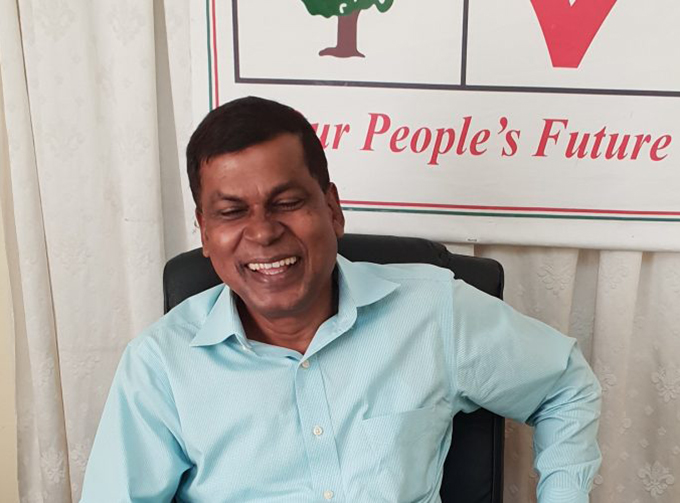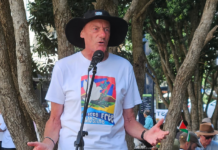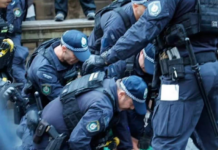
Fiji’s National Federation Party (NFP) leader, Professor Biman Prasad could find himself in the same position as New Zealand’s deputy prime minister and leader of the New Zealand First Party, Winston Peters, if there is a major swing against the ruling FijiFirst Party. Sri Krishnamurthi talks to the man who might be the kingmaker after the Fiji general election, due later this year.
The National Federation Party (NFP) is the oldest political party in Fiji. It was founded by A.D. Patel in 1968 as a merger between the National Democratic Party and the Federation Party.
It has survived through four coups and it has had its ups and down, but never out, having secured three MPs in Parliament in the 2014 election (FijiFirst has 32 seats, SODELPA has 15).
A professor of economics, Biman Prasad, who was former dean of the Faculty of Business and Economics at the University of the South Pacific is the man in charge of NFP since taking over the leadership in 2014.

He could possibly be the kingmaker of the next government if his party wins as many as 10-seats in a 50-seat Parliament – as some predict. And, he, like Peters, is giving nothing away.
“Somebody has called me ‘Winston Prasad’,” he laughed, of the man he was likened to in the Fiji Sun.
“It’s possible, but first we want to be a major party. I’ve looked at the agreement that he (Peters) has with Labour because we follow New Zealand and Australian politics very closely,” the former academic said.
“We are hoping to get a good number of seats, if not, the majority of seats. And we are being realistic because we got three seats in the last election, but strange things have happened in politics.
‘Fighting on our own’
“We may not need another party. We have said we are fighting the election on our own. As for a coalition, you can ask the other parties who they are going to go with.
“That is a question best left until after elections because it comes down to negotiations and the various policies of each party.”
At best, he can hope for a coalition with the ruling FijiFirst Party, holding at least 60 per cent of the vote in the 2014 election, and in many eyes, the favourite in this election.
In the event of an upset, NFP’s other option could be the major indigenous Fijian party, the Social Democratic Liberal Party (SODEPLA), led by 1987 coup leader and former prime minister, Sitiveni Rabuka, although Prasad is not confirming much in this regard, preferring to wait and see how the votes swing.
Prasad is adamant that he has not jumped the gun by announcing some of his candidates early and drip feeding his policies in print since July last year – suggesting that his was the first party to do so.
“We are the only party that has announced almost all its candidates. We started this early and we have announced major policies.”
One of the key planks in the NFP’s foreign policy, which he announced last week, was his support of the West Papua struggle for independence, which SODELPA endorsed a fortnight ago.
Support for West Papua
“We feel Fiji should support its Melanesian brothers. If smaller countries like Vanuatu and the Solomon Islands can raise this issue then we must do something about it,” he said.
Prasad is also concerned about Fiji’s debt, which he places at about F$5.5 billion, especially the $500 million reportedly owed to China.
He points out that for the 2018/19 financial year, the repayment is $635 million, of which $300 million is interest alone.
“We need about $53 million cash every month for payment,” he said.
But, Fiji’s Economy Minister Aiyaz Sayed-Khaiyum said in May this year that the World Bank had done a thorough analysis of the national debt and was convinced it was manageable.
NFP has other policies of note like increasing the minimum wage and addressing the cost of living designed to get them into the driver’s seat post-election by appealing to the common vote.
Prasad alleges that despite the “handouts” and “freebies” dispensed by government, the people are struggling because of the high and mounting cost of living.
People disenchanted
He said people were disenchanted and this would be seen in the voting patterns.
However, could waiting for the election take the sting out of his campaign, given that they have been gearing up for it for a long time now?
“As a party, we are ready whenever the election is called. Technically, the election could have been held after April 6; that is the earliest that Parliament could have been dissolved,” he explained.
“That is when we finish three-and-a-half years. The Constitution says you cannot dissolve Parliament and have an election before three years and six months has elapsed from the first sitting of Parliament.
“The writ can be issued once Parliament is dissolved in that six months. If it is not dissolved before October 6, then it will automatically dissolve by that date. Once Parliament is dissolved, within seven days the writ is issued.
“Once the writ is issued, you have 14 days for nominations and then you have a maximum of 30 days for elections. The last date is November 21.”
The final word on the oldest party in Fiji that is defiant is that the curtains aren’t set to come down yet.
“I am confident we are going to be in government, whether jointly or on our own, and that is the feedback we are getting,” Prasad says confidently.
Spoken like Winston.
Sri Krishnamurthi is a journalist and Postgraduate Diploma in Communication Studies student at Auckland University of Technology. He is attached to the University of the South Pacific’s Journalism Programme, filing for USP’s Wansolwara News and the AUT Pacific Media Centre’s Asia Pacific Report.






































